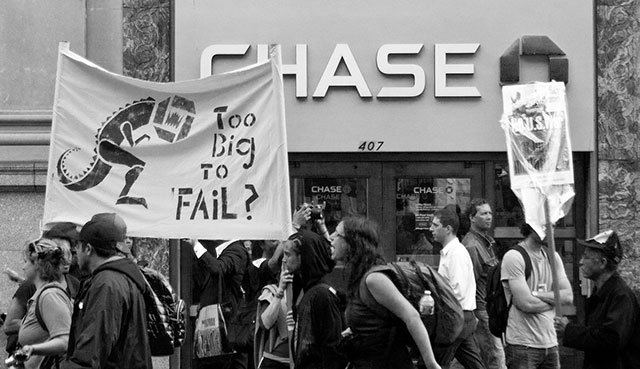
Truthout is a vital news source and a living history of political struggle. If you think our work is valuable, support us with a donation of any size.
Federal regulators announced Wednesday morning that Dodd-Frank-mandated resolution plans of five “too big to fail” banks were “not credible,” setting in motion a process that could see them broken up in thirty months.
The Federal Deposit Insurance Corporation (FDIC) and Federal Reserve on Wednesday announced that plans outlined by the quintet — Bank of America, JP Morgan Chase, Wells Fargo, New York Mellon, and State Street — were inadequate.
Because of the joint ruling, the firms are under pressure to revise their so-called “living wills.” The FDIC and Fed may subject the five banks to more strict regulations and reserve requirements on Oct. 1, if they fail to submit a satisfactory scheme by then. And if they haven’t submitted proper living wills by October 2018, the two agencies “may jointly require the firm to divest certain assets or operations to facilitate an orderly resolution of the firm in bankruptcy,” as the Fed noted on Wednesday.
Three other Wall Street behemoths escaped a similarly bleak scenario for their shareholders. The Fed and FDIC said they disagreed about the credibility of the “living wills” hashed out by Goldman Sachs and Morgan Stanley — only the FDIC deemed Goldman’s plan “not credible,” while the Fed shot down Morgan Stanley’s proposal. Citigroup, meanwhile, had its plans almost approved, though both agencies “did identify shortcomings that the firm must address.”
In February, Sen. Elizabeth Warren (D-Mass.) explained the significance of joint Fed-FDIC “not credible” determinations on living wills, when asking Fed Chair Janet Yellen about previous rulings made in 2014.
“The Fed’s refusal to call the plans ‘not credible’ meant the agencies couldn’t use statutory rules to push these risky banks in the right direction,” Warren said in a Senate Banking Committee hearing.
When Dodd-Frank financial reform was passed in 2010, Congress created an inter-agency body called the Federal Stability Oversight Council (FSOC) and gave it the power to declare certain banks, investment firms and insurance companies “SIFI” — systemically-important financial institutions.
The law concurrently forced outfits slapped with the SIFI-label to formulate living wills; to minimize the possibility of 2008-style market failure and publicly-funded bailouts, in the event of financial instability.
“Each plan … must describe the company’s strategy for rapid and orderly resolution under bankruptcy in the event of material financial distress or failure of the company,” the Fed noted Wednesday.
The eight banks whose living wills were assessed on Monday are the only SIFIs based in the United States. The Fed and FDIC are still assessing plans being written by four foreign SIFIs: Barclays PLC, Credit Suisse Group, Deutsche Bank AG, and UBS.
A terrifying moment. We appeal for your support.
In the last weeks, we have witnessed an authoritarian assault on communities in Minnesota and across the nation.
The need for truthful, grassroots reporting is urgent at this cataclysmic historical moment. Yet, Trump-aligned billionaires and other allies have taken over many legacy media outlets — the culmination of a decades-long campaign to place control of the narrative into the hands of the political right.
We refuse to let Trump’s blatant propaganda machine go unchecked. Untethered to corporate ownership or advertisers, Truthout remains fearless in our reporting and our determination to use journalism as a tool for justice.
But we need your help just to fund our basic expenses. Over 80 percent of Truthout’s funding comes from small individual donations from our community of readers, and over a third of our total budget is supported by recurring monthly donors.
Truthout has launched a fundraiser, and we have a goal to add 280 new monthly donors in the next 72 hours. Whether you can make a small monthly donation or a larger one-time gift, Truthout only works with your support.